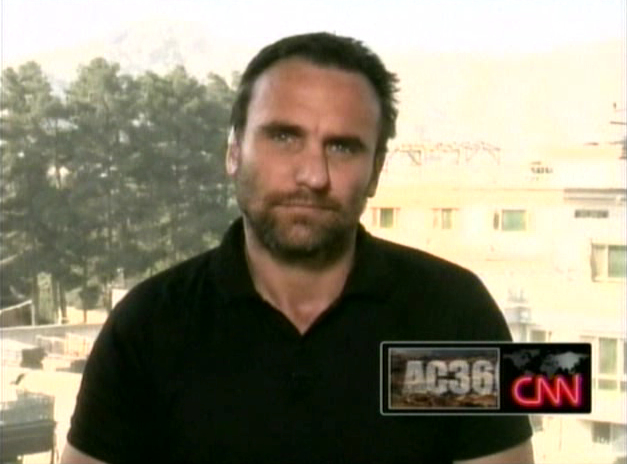AC360 special: Inside the Battle Zone
Friday, September 11, 2009

Length: 3:36
LARGE (41.6 MB) ----- SMALL (4.4 MB)
The AC360 special "Inside the Battle Zone" was mostly the reports shown during the week, but there was some new material, including this conversation amongst Anderson Cooper, Peter Bergen, and Michael.
ANDERSON COOPER: Two journalists who know this area, this story better than most are National Security analyst Peter Bergen and Michael Ware. They were covering Afghanistan long before U.S. troops arrived.
(BEGIN VIDEOTAPE)
Michael, just watching the danger from IEDs. You never used to really see IEDs, you never used to see suicide attacks here in Afghanistan. The war is evolving.
From your take, from your travels, what's the status of the war? How is it going?
MICHAEL WARE, CNN INTERNATIONAL CORRESPONDENT: Well, it's obviously in a perilous state. The war simply is not going well. And no one here at ISAF headquarters in Kabul would disagree with that. The Taliban is as strong as ever. And their war machine shows no signs of abating.
There is not enough coalition troops here now nor Afghan troops to partner them. And even if President Obama does send reinforcements, there still won't be enough. The most that anyone can hope to achieve is to put enough pressure militarily on the Taliban to pay dividends elsewhere such as at the negotiating table.
And that's one of the reasons why the Afghan government and the U.S. military are now looking to draw on their lessons from Iraq and turn to U.S.-backed militias to start fighting where the Americans cannot -- Anderson.
COOPER: Peter, what's your assessment? Do you agree with Michael?
PETER BERGEN, CNN NATIONAL SECURITY ANALYST: Well, the Taliban certainly aren't losing, which in an insurgency means that you're winning. I mean, the Taliban strategy is to wait out the international forces. They know there is a political timeline in the United States, so maybe a year or so. If they can wait the United States out, they've won.
So that -- I mean -- and according to a map that CNN obtained of Taliban presence in the country in the spring, 40 percent of the country was either controlled by the Taliban or at high risk for Taliban attacks.
COOPER: 40 percent?
BERGEN: 40 percent.
COOPER: Michael, one encouraging thing is a lot of the Marines here have had experience in Iraq, in the Anbar awakening. So they're trying to bring some of the lessons from that over here as you mentioned.
How likely is it that you can negotiate or co-opt or pay off segments of the Taliban?
WARE: Well, that's not such a far stretch at all, Anderson, and indeed, you don't even start with the Taliban. You have entire tribes who are sitting there around where you are in Helmand, in southern -- across southern Afghanistan who by and large have been ignored and neglected by the U.S. mission.
You also have the veterans of the Soviet war. Many of whom are now joining the Taliban. But their heart is not in that fight. So we're seeing a pilot program already beginning where they are drawing militia members from the local tribes in Kandahar and starting to bring back some of the Soviet veterans.
The Afghan government has told us exclusively that this program has begun.
COOPER: It seems, Peter, that there's no doubt that the U.S. is going to ask for -- or the military leaders in the U.S. are going to ask for more troops. It's a political decision on whether or not they actually get it.
But there's no way U.S. forces can be -- or even NATO forces can be in all the areas where the Taliban is operating. I mean you could -- you know, you can build a road and you can set up checkpoints. But they just move somewhere else.
BERGEN: Yes, so it's a matter of triage -- only 12 percent of this country is -- could sustain a population where you've got the water and the agriculture. So we're sitting here in the middle of the desert. You don't have to secure this enormous desert. It's a matter of choosing your targets, protecting the population centers where people really live.
In Helmand, for instance, they're on the Helmand River, that's where everybody lives. The rest of the province is empty. There's no need to secure that. So you don't need to secure everything.
COOPER: Michael Ware in Kabul. Peter Bergen here thanks.
